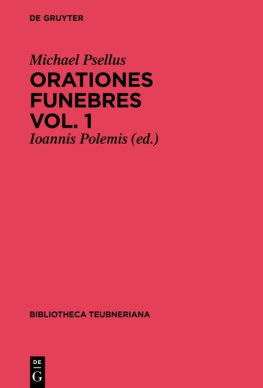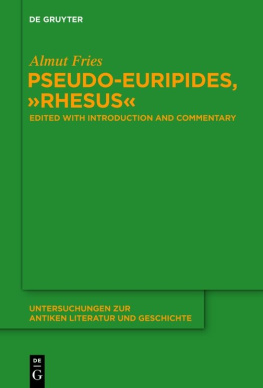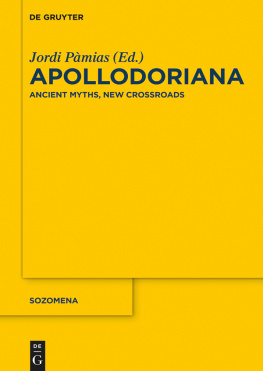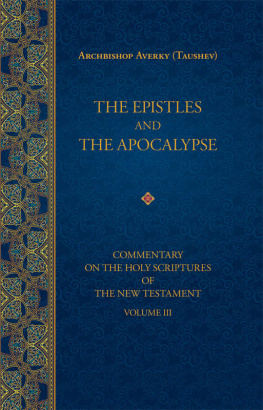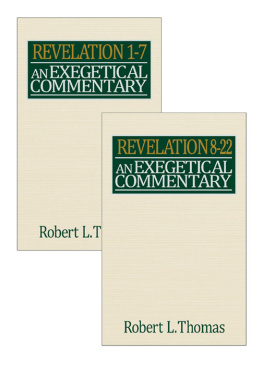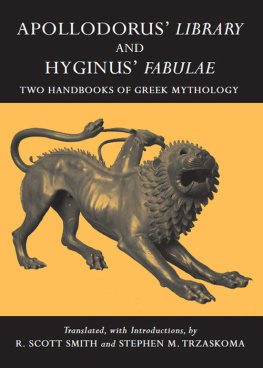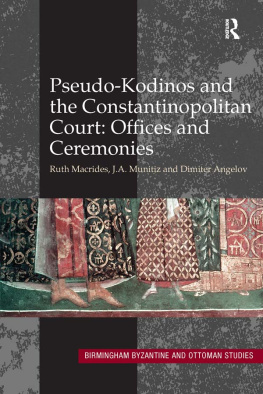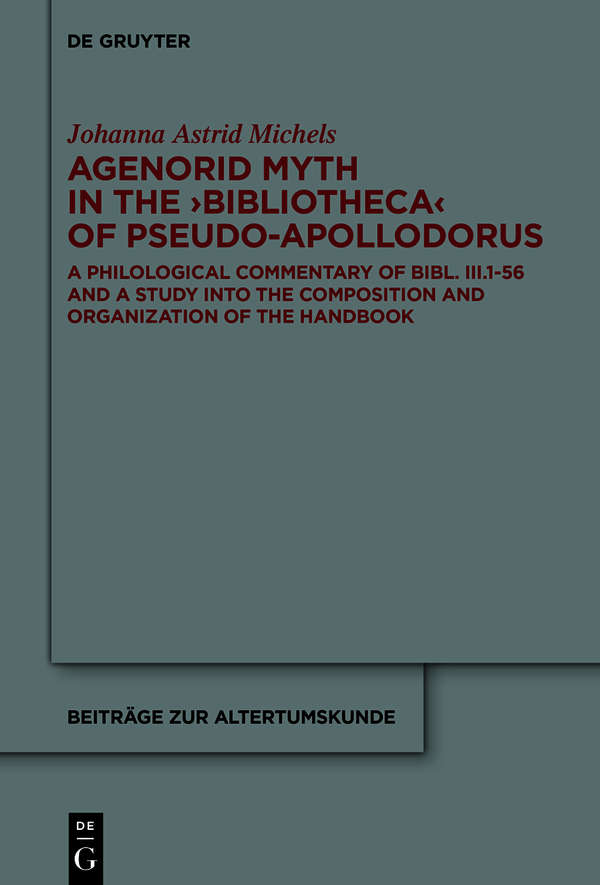Beitrge zur Altertumskunde
Edited by
Susanne Daub
Michael Erler
Dorothee Gall
Ludwig Koenen
Clemens Zintzen
Volume
ISBN 9783110602791
e-ISBN (PDF) 9783110610529
e-ISBN (EPUB) 9783110610222
Bibliographic information published by the Deutsche Nationalbibliothek
The Deutsche Nationalbibliothek lists this publication in the Deutsche Nationalbibliografie; detailed bibliographic data are available on the Internet at http://dnb.dnb.de.
2022 Walter de Gruyter GmbH, Berlin/Boston
Introduction
If asked to name a typical mythographer, most scholars would probably come up with Apollodorus. Yet the Bibliotheca is the only comprehensive mythographic work of its age.
Alan Cameron (2004) x
Greek mythography is best known by way of its earliest representatives (particularly Hecataeus, Acusilaus, Pherecydes, and Hellanicus), the development of critical voices who analyzed and interpreted myth (allegory, rationalization, euhemerism), and the handbooks of the late Hellenistic and early imperial period (the likes of Ps.-Apollodorus and Ps.-Hyginus). Beyond these authors lies a wealth of mythographic texts, most of them lost or indirectly preserved and (as papyrus finds demonstrate) a significant amount even completely unknown. Of all mythographic texts known to us, the Bibliotheca is most likely to ring a bell with non-specialists, because of its accessibility (few match its state of preservation) and its comprehensive aim. Due to its privileged position the Bibliotheca is regularly seen as a model specimen of what mythography looked like but, as Cameron points out, its comprehensive scope is almost unique.
In truth ancient mythography is very diverse. It spans a period from the sixth century BCE until well past its post-classical bloom. Not all mythography is popularizing, there are also traces of Alexandrian erudition (as paraliterary papyri attest), and it is not strictly a Greek affair either (e.g. the Narrationes fabularum Ovidianarum). Furthermore, whereas some mythographic projects stand in close relation to a literary text (e.g. the by the Mythographus Homericus, the narrative hypotheseis of tragic plays, the commentary on Statius Thebais), others like the Bibliotheca are entirely independent collections. Some of these collections have a comprehensive aim (the Bibliotheca, Pherecydes Historiae, and Ps.-Hyginus Fabulae); others have a specific focus (e.g. Parthenius sorrows of love). A final distinction concerns the mythographers approach to myth: alongside those who, like the author of the Bibliotheca, only record and paraphrase, there are authors who interpret and analyze myths (e.g. Herodorus and Palaephatus). What is it then that characterizes all these texts and brings them together under the umbrella of mythography?
Mythography was, in fact, a remarkable creation. It required much independence of mind, and a particular combination of historical and intellectual circumstances, to create a genre in which what one might call the facts of mythology were isolated from everything else that went with it in Greek society: the gathering of people, the intimate links with ritual, the mimetic performance of poets and actors, the authority of Muse and tradition.
Robert Fowler (2006b) 44
It is not necessary to delve into the origin, development, nature, or confines of mythographic writing, since there have in recent years been a good number of excellent publications on the subject. I limit myself to a short description of some of its characteristics. Whether their aim is to record myths or to interpret them, all mythographers communicate and organize mythical information in an accessible account. Their narrative style is straightforward and impersonal, characterized by plain prose and linear descriptions without literary pretensions or concern for embellishment. A distinctive feature of post-Callimachean mythographic texts are the references to authoritative sources, recuperated from previous writers.
Mythographers cultivate an appearance of keeping to the facts and strip away the social, ritual, or literary context in which the reported myth version previously functioned. Especially in authors not interested in interpretation like Ps.-Apollodorus, the subject matter has become increasingly self-contained, as they do not contextualize myths in a historiographical project (unlike a Diodorus) and do not link them to the present or the immediate historical past (except for aetiological reasons). The description (and analysis) of myths is an end in itself.
This no-nonsense approach has contributed to the appeal of mythographic texts (then and now), but also to the lack of scholarly attention to the mythographic practice and its socio-cultural relevance that is, until recently.
It is a great time to be working on the Bibliotheca, and on Greek mythography in generatel. Not only did the last decades see two new editions and translations in ten languages,
Van Rossum-Steenbeeks work on the subliterary papyri (1998), Fowlers edition of and commentary on the early Greek mythographers (2000, 2013), and Camerons study into the social function of Greek mythography in the Roman world and its approach to source references (2004) gave new impulses to mythographic research. It is exciting to see how these texts, which for a long time remained mainly in the margin of other fields of research, are now taken seriously as objects of study themselves, as recent collections of articles reaffirm. Amid this revival of interest it is high time to unlock the most consulted mythographic text and to provide a scholarly basis for further research.
It is usual to sneer at the Bibliotheca, which was no doubt a derivative work. But it is a tour de force of organizationa mass of proper names and genealogical information subordinated to an essentially narrative principle and is highly readable.
Simon Hornblower, Apollodorus [9] in OCD4 (2012) 120
This study wishes neither to heap praise on the author of the Bibliotheca nor to count its many deficiencies. It aims to unlock the Bibliotheca as a mythographic text in its own right and to provide an instrument that allows users to assess the mythical narratives in the Bibliotheca in the correct framework. A key aspect of this objective is to counteract the way in which the handbook has regularly been disregarded and misjudged as a repository of standard versions of myths or as a primary witness to the archaic stories. Such a reductive view at once underestimates and romanticizes the merits of the Bibliotheca.
Combined, the persistent misconceptions about the representative character of the Bibliothecas myths, about Ps.-Apollodorus personal merits as an author/compiler, and about his source use have divided the scholarship on the mythographic handbook and are liable to mislead those who are not versed in the debate.
.
In general, the Greeks disagree for the most part among each other [on mythical subjects].
Pausanias, Periegesis 9.16.7
Apollodoros handbook, valuable though it may be, is an avowed synthesis, one designed to knit together disparate elements from many different sources (or earlier compilations of those sources) into a relatively seamless whole. As such, it inevitably promotes the concept of Greek myths as a cultural commodity, the product of a united Greek mind rather than contributions from many different tellers of tales in many different contexts over a great span of time.


